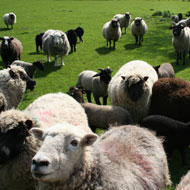Study to ‘underpin direction of sheep genetics’

"...in the post-Brexit era, we are in a very strong position to influence how best to increase efficiencies in sheep meat production."
A new study is set to drive the future direction of sheep genetics in the UK, Scotland’s Rural College (SRUC) has revealed.
The project team, led by SRUC, will be comprised of industry experts and researchers who will make breeding recommendations to maximise genetic, economic and environmental gain.
Dr Joanne Conington, livestock geneticist at SRUC, said: “This study will underpin the future direction of sheep genetics in the UK.
“It is timely because in the post-Brexit era, we are in a very strong position to influence how best to increase efficiencies in sheep meat production to better meet the needs of meat processors and consumers, while also keeping a close eye on welfare, environmental footprint and sheep meat quality.”
A review will report on the latest global developments in genetic and genomic approaches, and explore how these could enhance productivity and sustainability of the UK sheep flock.
This will inform the development of breeding goals to deliver gains in maternal upland, maternal lowland and terminal production systems. The goals will be further refined through stakeholder interviews and industry workshops.
Ultimately, the team will estimate the economic impact of implementing the breeding goals.



 The Animal and Plant Health Agency (APHA) has updated its online reporting service for dead wild birds.
The Animal and Plant Health Agency (APHA) has updated its online reporting service for dead wild birds.